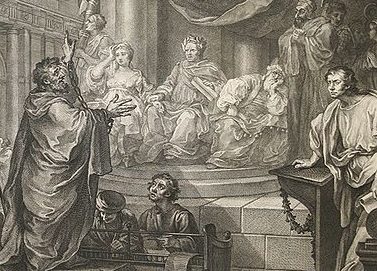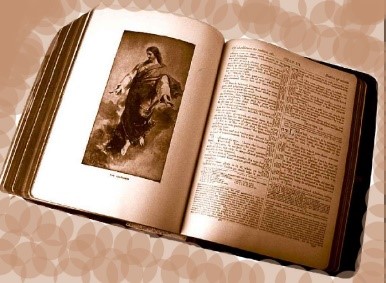Drusilla the Wife of Felix

Drusilla was the wife of Felix. We know she was a Jewess. Paul took advantage of his trial before Drusilla and Felix to proclaim Jesus Christ as Lord. Drusilla had turned her head against the lessons that Paul was trying to teach. (Acts 24:24).
Drusilla the wife of Felix was a Jewess who was with her husband and heard Paul concerning the faith in Christ. Felix was the Roman procurator. Procurator was the title of various officials of the Roman Empire who was an agent that would represent others in a court of law. Drusilla was third and youngest daughter of Herod Agrippa I. and the sister of Bernice. (Acts 12:1-4, 20-23). The behavior and conduct of Bernice was scandalous even the citizens of Rome would not accept. Drusilla appears not to be much better in her conduct than her sister Bernice. She was a woman of great personal beauty and married Azizus, king of Syrian Emesa, then persuaded to marry Felix the procurator of Judea. Felix and Drusilla had a son Agrippa. According to Josephus, Drusilla and her son, Agrippa perished in the eruption of Vesuvius, in 79 A.D. (Thein. 1900. P. 266).
The defense of Paul before Felix and Drusilla
Paul had been accused by Tertullus as being a troublemaker, a leader of the Nazarene sect, and a desecrator of the temple. Paul acknowledged that Felix had been a judge for many years and Paul was cheerful to answer for himself. Paul knew that Felix would understand it had been twelve days since he went up to Jerusalem to worship. Paul denied he had stirred up the crowd either in the synagogues of anywhere in Jerusalem. He professed to worship the LORD God of Israel the God of his fathers. Paul attested that he believed all things which were written in the Law and in the prophets; supports and advocates the teachings of the Scriptures, and believes in the resurrection of the dead, both the just and unjust. Paul states he had always a conscience void of offense toward God, and toward men. He informs Felix that he came to Jerusalem to bring gifts to the poor and to present offerings. He says that if the Jews from the province of Asia, who are absent, or the delegation from Jerusalem have any charges, they should state them before Felix. (Act 24:10-21).
Felix deferred the proceedings and announces that he will make a decision when the military commander Lysias arrives. He orders that Paul be kept in custody but have the freedom to receive friends. Felix and Drusilla visit Paul for the purpose of hearing Paul preach about the Christian faith. When Paul discusses righteousness, self-control, and judgment, Felix terminates the meeting with the promise of summoning Paul some other time. He summons Paul frequently but expects to receive a bribe from him. After a two-year period has ended, Felix is succeeded by Porcius Festus and Paul remains a prisoner. (Act 24:22-26).
Drusilla heard Paul’s teachings about righteousness dealing with the right and the wrong. Paul also taught about always having a good conscience void of offense, which is to avoid leading others into sin by what comes out of his mouth or by his action. This is huge. This is a lesson we should all learn about a good conscience toward the LORD and toward men. Drusilla did not heed the teachings of Paul and both Drusilla and Felix were wicked immoral people. Felix was a cruel greedy immoral person. Drusilla also was equally wicked and vile. She had married Azizus, king of Emesa of Syria, but left him to marry Felix. Drusilla reflected the character of the shameful family from which she came. Her great-grandfather, Herod the Great tried to kill the Jesus in Bethlehem and the children that were in Bethlehem, and in all the coasts thereof, from two years old and under. (Matthew 2:15-16). Her great-uncle Herod Antipas had John the Baptist beheaded. (Matthew 14:10). The father of Drusilla, Herod Agrippa I, killed the Apostle James (Acts 12). Agrippa II, the brother of Drusilla lived an incestuous life with Bernice, who was the sister Drusilla (Acts 25:23).
Drusilla had an excellent opportunity to gain growth in her spiritual life. Instead Drusilla and Felix were holding out for money from Paul. , under the pretense of wanting to hear more about the faith in Christ sent often to hear Paul. But the real reason he wanted to hear Paul was to obtain a bribe from Paul. Doesn’t that sound familiar? How many people do you know that are holding out for that payment for their good works they do in the name of Christ? It’s like the organizer of the potluck dinner at church who go on and on about their accomplishments of the dinner and how great they have done. It’s like the Christians who are waiting for their posterity for all their good works and patience in waiting for their turn for riches. Even those who show up at church in pretense of worshipping the LORD but in reality only come to gain customers for their business, or they come to meet friends, some even come to hear the latest gossip. Just like Drusilla they are more interested in how they look to those around them that in gaining growth in their spiritual life.
Felix was the Roman procurator. When a complaint was brought against a Roman citizen it would have been the job of Felix to appoint the time for a hearing, detaining the accused in custody during the time before the case was heard. There were no set boundaries for the time a person had to be tried. Felix as the Roman procurator had the right to defer it at his own pleasure; and he might also commit the prisoner, in this case Paul, at his discretion to any of the several kinds of custody recognized by the Roman law. (Denton. 1876. Ps 306-07). Paul was given in charge to a soldier, who was responsible with his own life for the safe keeping of his prisoners. Their prisoner was usually kept in their barracks, but sometimes allowed to reside in a private house under their charge. That was the case with Paul. (Acts 24:23). Paul took advantage of his trial before Drusilla and Felix to proclaim Jesus Christ as Lord. Drusilla had turned her head against the lessons that Paul was trying to teach.
References:
Denton, W.(1876). A Commentary on the Acts of the Apostles, Vol. 2.London: George Bell and Sons.
Thein, John. (1900). Ecclesiastical Dictionary: Containing, in Concise Form, Information Upon Ecclesiastical, Biblical, ArchÊological, and Historical Subjects. New York;Cincinnati;Chicago: Benziger Brothers.
Cite Article Source
MLA Style Citation:
Holstein, Joanne “Drusilla the Wife of Felix:.” Becker Bible Studies Library Oct 2014.< https://guidedbiblestudies.com/?p=1454,>.
APA Style Citation:
Holstein, Joanne (2014, October) “Drusilla the Wife of Felix:.” Becker Bible Studies Library. Retrieved from https://guidedbiblestudies.com/?p=1454 ,.
Chicago Style Citation:
Holstein, Joanne (2014) “Drusilla the Wife of Felix:.” Becker Bible Studies Library (October), https://guidedbiblestudies.com/?p=1454 , (accessed).


